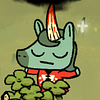You need to sign in or sign up before continuing.
Take a photo of a barcode or cover
fast-paced
Borges open the mind like earth to be cultivated with the seeds of imagination. A must read for the fantasy lover, those who search for symbols, and those who hunt the impossible.

I stumbled upon this book in a used book store many years ago and didn't end up buying it, convincing myself that I would find it the next time I visited. Well, I visited and it was gone and I've learned my lesson about making purchases in used book stores.
But my friends know me very well and when one of my friends was visiting the U.K. she got me this book as a present because it reminded her of Fantastic Beasts and Where to Find Them by Newt Scamander (J.K. Rowling) and she thought it was something I would like, and she of course was right.
I've always loved mythical creatures, since my first love of unicorns it's just evolved into different creatures and different mythologies. Jorges Luis Borges does an amazing job researching and writing about various different mythical creatures from the unicorns, centaurs, and dragons we know of, the Minotaur and nymphs from Greek mythology, to creatures from North America we may not be familiar with like the Hidebehind, Teakettler, and Goofang. And of course Borges highlights other cultures creatures that we may be even less familiar with like the Kami (Japan), the Lamed Wufniks (Jewish), and the Remora (Greek). I wish I could pick a creature in this book that stood out for me but there was so much to learn I couldn't help but fall in love with every creature.
The Book of Imaginary Beings is a fantastic read for anyone who loves mythical creatures and a book I will definitely return to so that my knowledge of these creatures can grow and someday I can name them off the top of my head. Who knows, maybe I could be a Newt Scamander someday?
quaint little book with many interesting insights into mythical creatures old n new, familiar and unfamiliar. my favourites were kafka's crossbreed of a lamb and a cat, the odradek - an animate thread spool, monkey of the inkpot - a monkey that likes to drink ink, and jakob lorber's leveller/ground-flattener - a giant green elephant alien with pyramids for legs that lives on Neptune.
Now I want even more imaginary beings. More! This book introduces us to 116 in their varied forms--but there are more versions now, and even more creatures. Rowling's mandrakes and hippogriffs, for example. Movies and retellings that recall and subvert.
I like how seriously Borges takes the existence of imaginary beings. It's not that he believes in them, because he doesn't. But they exist in our social awareness, our collected imagination. In many cases that collected mind spans the whole earth, in almost every culture and language. And he's right. That is interesting.
I like how seriously Borges takes the existence of imaginary beings. It's not that he believes in them, because he doesn't. But they exist in our social awareness, our collected imagination. In many cases that collected mind spans the whole earth, in almost every culture and language. And he's right. That is interesting.
This book was recommended to me because I loved Calvino's Invisible Cities. It is nice, but not nearly as nice as Invisible Cities. I think I prefer that book because it is a connected story.
4 decades before J. K. Rowling wrote "[b:Fantastic Beasts and Where to Find Them|41899|Fantastic Beasts and Where to Find Them (Hogwarts Library)|Newt Scamander|https://i.gr-assets.com/images/S/compressed.photo.goodreads.com/books/1303738520l/41899._SX50_.jpg|4195128]", the great Argentine writer Jorge Luis Borges wrote "The Book of Imaginary Beings"
While Rowling wrote it as a Hogwarts' textbook with beings we find in the world of Harry Potter, Borges wrote about beings we find in the mythologies of every culture.
And because folklore, mythology, fantasy, and literature are influenced by one another, I found in this book many creatures that existed in Rowling's book, such as: Basilisk, Centaur, Chimera, Chinese Dragon, Hippogryff, Manticore, and many many more; 120 ( in Borges' book)
Of course in [b:El libro de los seres imaginarios|73410|El libro de los seres imaginarios|Jorge Luis Borges|https://i.gr-assets.com/images/S/compressed.photo.goodreads.com/books/1348545671l/73410._SY75_.jpg|2241328] by Borges there is more philosophy to be found, more intertextuality and references to other writers who made beings for their own stories (Kafka, C.S. Louis (Narnia) L. Carol (Alice in Wonderland), Edgar Allan Poe, and others).
Of course, without underestimating Rowling, I recommend Borges' book if you want to have a cerebral reading in addition to your entertaining reading.
If you like mythology, fantasy, Borges, and encyclopedic knowledge then this book is for you.
More in Greek at βιβλιοαλχημείες
I read this over ~6 months and that was the way to do it: I dipped in and out, occasionally read a few dozen entries in a week and then might ignore it for a month. Doing it that way helped reinforce the imaginary strangeness of the entities described on the pages herein. I wished, at times, for a little more invention/a little less academic dryness... but that, too, was part of the charm.
informative
slow-paced
Plot or Character Driven:
N/A
Strong character development:
No
Loveable characters:
No
Diverse cast of characters:
Yes
Flaws of characters a main focus:
N/A




